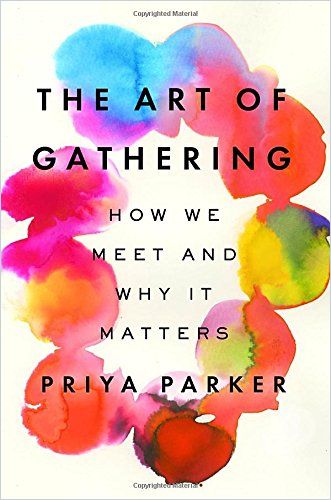Meetings maestro Priya Parker offers a lively, conversational guide to facilitating effective gatherings.

The Best Gatherings
Whether you gather to be cheerful – for a wedding, to be mournful – for a funeral, or to be productive and decisive – for a business meeting, gatherings structure today’s social and business life.
Priya Parker, founder of Thrive Labs and host of The New York Times podcast Together Apart, is a meetings facilitator who helps executives, activists and educators create transformative gatherings.
The first and perhaps most important use of your authority is the protection of your guests.Priya Parker
Identifying the purpose of a gathering, she insists, makes it meaningful. Parker asserts that a category – such a wedding or a meeting – is not a purpose. For example, a networking event might have the purpose of connecting people to solve shared problems. Or, she notes, that same networking event could intend to improve working relationships in the community. Both purposes are specific, and each requires the event organizer to structure the gathering differently.
Chris Anderson, the owner and curator of TED, certainly understands bringing people together for a higher purpose. He said, “Hosts of all kinds, this is a must-read!” Kirkus Reviews found it, “…useful to those whose job it is to plan meetings, conferences…and a worthy survival manual for consumers of the same.” In other words, Parker works a highly specific niche and seems to excel in her chosen field. Few reviewers would bother attacking a book like this unless Parker’s advice were terrible, and it’s not. Her counsel is hardly Earth-changing, but everyone has to host sometimes, and Parker eases the way.
Purpose
Parker explains that your purpose guides your guest list and your location. If you invite too many people, she warns, you may dilute your purpose. Instead, reframe “exclusion” as an act of kindness, so you can form the group you want to serve your purpose. Helping you find a high moral ground – or moral term – for something you might find distasteful is no easy trick; Parker’s skill helps explain her popularity.
Ninety percent of what makes a gathering successful is put in place beforehand.Priya Parker
When it comes to your second decision, different locations give a different sense of “embodiment.” Your behavior in a courtroom, Parker notes, differs from your behavior in a boardroom. The author offers the obvious when she reminds you oversized spaces can dilute your gathering’s purpose, but more originally she notes that your selection of where to meet “is one of your most powerful levers over your guests’ behavior.”
As the convener of a social or business gathering, you might feel the need to be a minimal host and leave your guests to themselves. But, when you commit to hosting a gathering, the author calls on you to do so with authority by giving directions and making the meeting’s ground rules explicit.
The most important use of your generous authority, Parker says, is to protect your guests, by, for example, rescuing someone from an uncomfortable conversation, asking someone who is speaking loudly on his or her phone to pipe down, or gently reminding a domineering participant that other people want to contribute. For a private gathering, such as weddings, she recommends asking guests to be fully present and unplugged – to leave their phones at home.
Make sure your guests get to know one another and start forming a tribe of those attending. If the people you gathered develop independent connections, that indicates that your meeting or event was a success.
Execution
Parker breaks down the execution of a gathering into Priming – sending an email ahead of time stating the meeting’s purpose, Ushering – bringing guests into your world and making them welcome, and Launching – stating your purpose, with a message of meaning and impact that supports it.
More and more of us, do not live in closed circles of like-minded, similarly raised people.Priya Parker
Conferences often fail to bring people closer together, because they tend to focus on what happens onstage and less on what happens among participants. To turn this around, integrate your guests into your gathering by asking them questions and giving them a chance to participate. When you do so, you make people aware of one another, and create something larger than the sum of the individuals.
Parker explains how to close your gathering on a positive note. Spend as much time thinking about the closing as you spend thinking about the opening. A strong wrap-up shapes your guests’ sense of the event and their collective memory of what happened. Guide your guests to take stock of their experience collectively. For example, you might include a closing session in your workshop in which each participant has two minutes to voice his or her impressions.
At the end of any gathering, remember your purpose and sum it up with a fitting exit line. Parker suggests it can be as simple as closing your notebook, pausing, and looking up to say, “I pronounce this meeting – closed!”
Ultimately, seek to create a temporary alternative world that exists only once.
Meeting Fundamentals
Priya Parker helps you improve any kind of gathering, from parties to unproductive work meetings. Even if you wouldn’t exactly do everything she suggests – and some of her suggestions are ideas you thought of in Eighth Grade – Parker possesses a fine sense of purpose, place and pace. She does write with perhaps an excess of enthusiasm about a subject you might not feel all that enthused about, but such enthusiasm comes with her job description and proves digestible. If you dread planning any gathering of any kind, feel like your party skills need an upgrade, or want to cope with weddings, funerals or workshops with grace, Parker’s manual of fundamentals offers worthwhile, basic advice.
A talented gatherer doesn’t hope for disparate people to become a group. She makes them a group.Priya Parker
Priya Parker also wrote Hungry Hearts. Other helpful books about managing meetings and gatherings include Bad Meetings Happen to Good People by Leigh Espy, The New Wedding Book by Michelle Bilodeau and Karen Cleveland, and Online Meetings That Matter by Pilar Oti.





